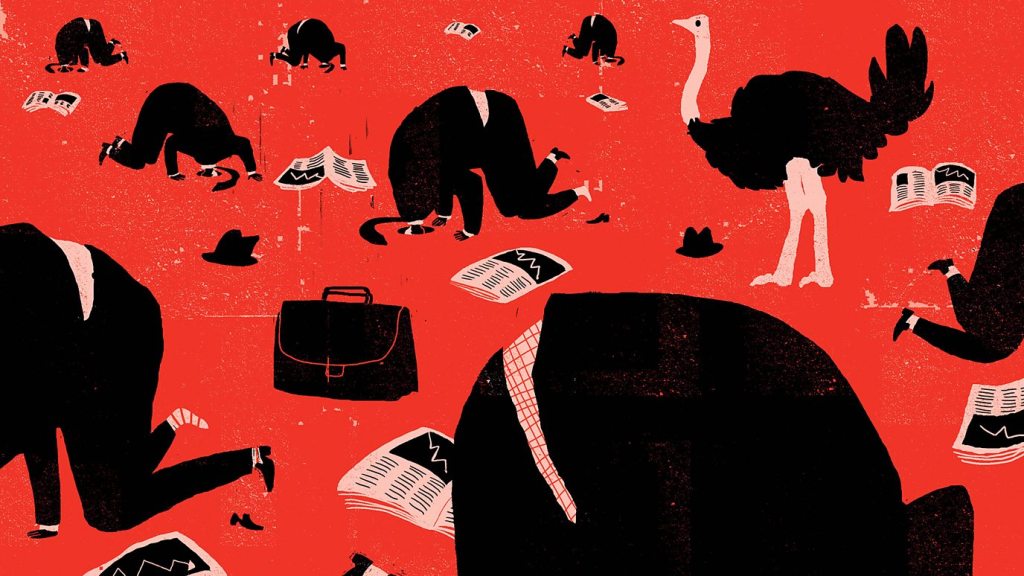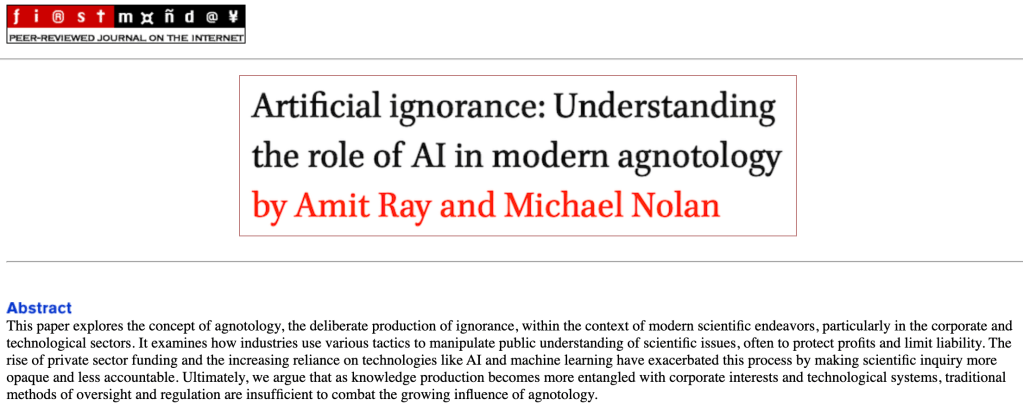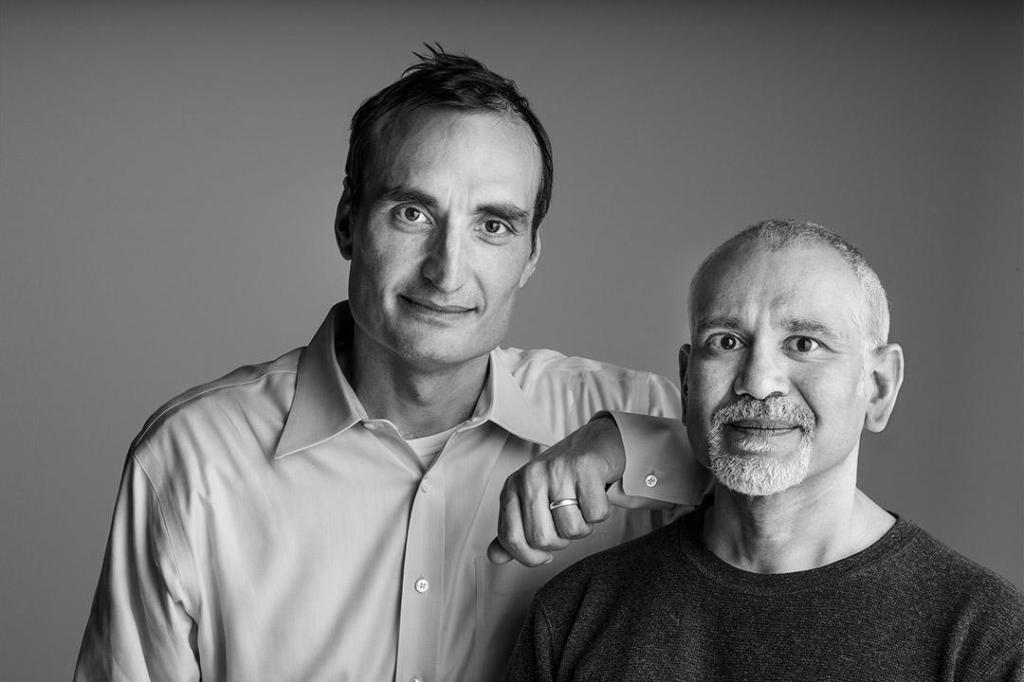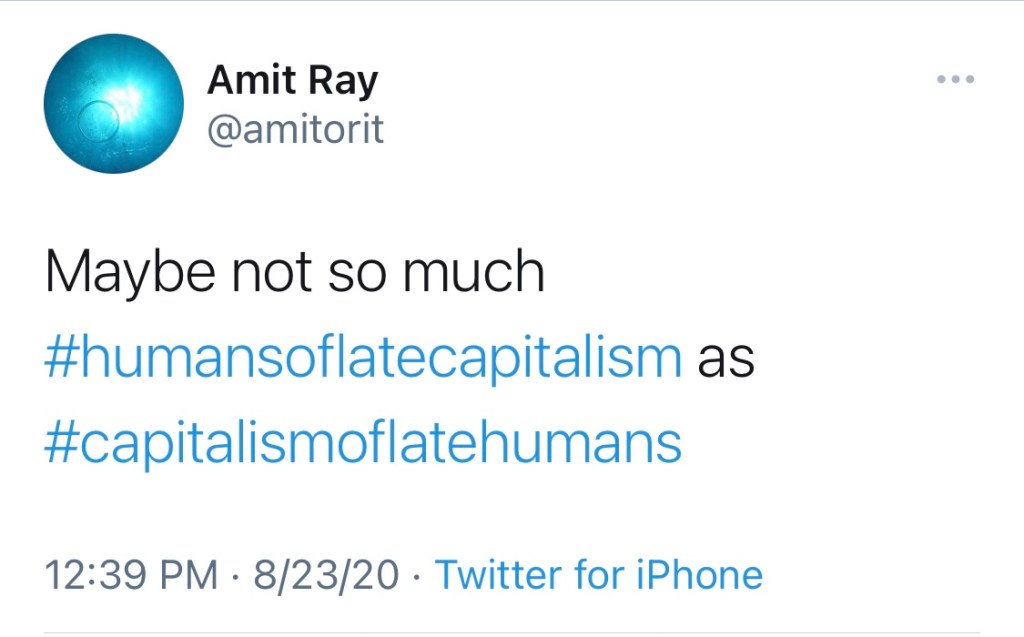Agnotology (or the Cultural Production of Ignorance) in Media and Culture: MLA-Toronto, January 8-11, 2026
Session 352. Date and Time: Friday, 9 January 5:15 PM-6:30 PM Location: MTCC – 714A
Panel Organizer: Amit Ray/Rochester Institute of Technology
contact email: axrgsl@rit.edu
This is an accepted Special Topics Panel for the Modern Language Association Conference in Toronto, January 8-11, 2026.
Agnotology, a term popularized by Historian of Science, Robert N. Proctor, refers to the study of culturally induced ignorance or doubt, particularly through the publication of inaccurate or misleading scientific data. In the context of media and technology, agnotology is seen in how information can be presented, manipulated, or withheld to create or perpetuate ignorance or misunderstanding among the public. These presentations aim to spark conversation by exploring how ignorance takes shape across three distinct cultural contexts.
NOTE: Due to visa issues, Rovel Sequeira will not be able to join us in person. His written presentation can be found below:
In “The Will-Not-To-Know: Prison Sexology and the Archive of Homosexuality in Colonial India,” Rovel Sequeira reinterprets early 20th-century colonial prisons as laboratories not only of sexual science but of ignorance production. The paper examines the role of agnotology in a suppressed scandal involving prison medical officers in Calcutta and the Andaman Islands, whose studies of same-sex practices among prisoners were censored by the colonial state. Labeled unscientific, these findings were barred from circulation even as they shaped prison discipline. This contradiction reveals a colonial will-to-ignorance: a refusal not only to generate knowledge but to allow its existence. Colonial sexology, rather than driven by a Foucauldian will-to-knowledge, operated through deliberate erasure. As focus shifted from anatomy to the surveillance of prisoner correspondence, knowledge was produced under intensified oversight and simultaneously disavowed. Ignorance became infrastructural, structuring sexual deviance as moral excess and legitimizing punitive isolation, while ensuring such knowledge remained hidden from public and scientific view.
Emanuelle Oliveira-Monte’s “Becoming A Crocodile: Brazilian Anti-Vaccine and Pro-Vaccine Memes During COVID-19,” explores Brazil’s pandemic media landscape. Amid staggering COVID-19 death tolls, President Jair Bolsonaro fostered a culture of denialism by downplaying the virus, spreading vaccine misinformation, withholding federal health funds, and calling COVID a “gripezinha.” Despite contracting the virus, Bolsonaro refused vaccination, later falsifying his vaccine card to enable international travel. Oliveira-Monte examines how this state-sponsored agnotology extended into digital culture through anti-vaccine memes that circulated widely on social media, reinforcing doubt and misinformation. These were met with counter-memes using satire and humor to expose Bolsonaro’s contradictions and encourage vaccination. By tracing this meme-based culture war, the paper shows how agnotology was both state policy and grassroots resistance battleground—mobilized to obscure science, but also to reassert it through digital critique and popular dissent.
In “Artificial Ignorance: Understanding the Role of AI in Modern Agnotology,” Amit Ray examines the deliberate opacity of Big Tech. Technology giants such as Google and Meta deploy secrecy to shield algorithms and data practices, often under the guise of trade protection and competitive advantage. These practices pose significant risks to individual privacy, democratic oversight, and ethical data use. Generative AI, particularly large language models (LLMs), has exacerbated this opacity through proprietary systems and inscrutable neural networks. While firms claim progress in transparency, most efforts amount to “open-washing,” masking closed, profit-driven operations as altruistic openness. The lack of meaningful regulation allows continued misuse, despite growing awareness of algorithmic bias and discrimination. The paper explores how open-source movements and independent research attempt to counterbalance Big Tech’s dominance, but these efforts often fall short against entrenched economic incentives. Ultimately, this analysis calls for robust regulation and genuinely open, accountable AI systems. He is currently working on a book entitled, Tales of the Late Human: Autocolonialism and Extinction, where he deploys the concept of autocolonialism–the manner by which digital platforms allow us to knowingly and unknowingly upload virtually everything about ourselves–to explore how hyper-capitalist techno-science simultaneously monetizes and exacerbates our threat of extinction.
Together, these three studies reveal that agnotology is not simply the absence of knowledge, but a strategic, contingent, and often institutional practice of withholding, obscuring, or discrediting information. Through the lenses of empire, media, and machine, these works show how agnotology is by no means a new phenomenon but is historically persistent and evolving in form. In the colonial archive, ignorance was enforced through institutional censorship and the classification of knowledge as deviant. In the digital pandemic age, ignorance moved through memes, state disinformation, and satirical resistance. In the age of AI, ignorance is embedded in algorithmic architectures, proprietary systems, and the economic logics that sustain them.
What links all three is the recognition that ignorance is not neutral. It is a political artifact shaped by institutions past and present—whether imperial, governmental, or corporate—often in service of control. Yet, each study also opens space for critique, resistance, and the reassertion of alternative epistemologies. The struggle over knowledge is ongoing and alive. In mapping these sites—colonial, viral, and computational—this synthesis calls for a broader awareness of how agnotology functions in our world, and more importantly, how it might be dismantled. Confronting the infrastructures of ignorance requires not only better transparency and regulation, but cultural strategies, historical awareness, and a commitment to epistemic justice that recognizes whose knowledge counts—and whose is erased.
Bios
Rovel Sequeira is an Assistant Professor of Women’s and Gender Studies and of English (by courtesy) at the University of Michigan-Ann Arbor. Rovel is currently working on a book manuscript on sexual scientific histories and fictions in India, tentatively titled The Empire and its Deviants: Global Sexology and the Racial Grammar of Sex in Colonial India. Rovel’s work has been published in Modernism/modernity, GLQ: A Journal of Lesbian and Gay Studies, Signs: A Journal of Women in Culture and Society, and History of the Human Sciences, among other venues.
Emanuelle Oliveira-Monte is an Associate Professor in the Department of Spanish and Portuguese at Vanderbilt University. She has authored two books and several articles on her field. Her book Writing Identity: The Politics of Contemporary Afro-Brazilian Literature examines the intricate connections between literary production and political action by focusing on the politics of the Brazilian black movement and the literature of São Paulo-based Afro-Brazilian writers, the Quilombhoje. She serves the profession through committees in several professional associations, including the Brazilian Studies Association and the Latin American Studies Association. She currently serves as the LLC Luso-Brazilian Delegate in the MLA Delegate Assembly.
Amit Ray is an Associate Professor in the Department of English at the Rochester Institute of Technology. Trained as a postcolonialist, his recent research focuses on issues of secrecy and agnotology within contemporary information systems. With neurologist Dr. E. Ray Dorsey, he co-authored “Paraquat, Parkinson’s Disease, and Agnotology,” published in the journal Movement Disorders in 2023. Since its publication, the article has been reprinted twice, which has led to subpoenas from Syngenta Corporation, a leading producer of the herbicide Paraquat, as part of ongoing class-action lawsuits.




